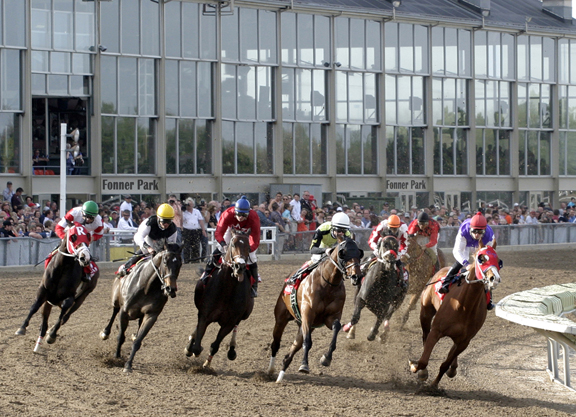By Bill Finley
Perhaps the most off-the-beaten-track in horse racing, Fonner Park sits isolated in Grand Island, Nebraska, unknown to most horseplayers and having to get by without any casino subsidies. Yet somehow it has survived, racing every year since it opened in 1954. The goal now is to make it another 36 days.
As one track after another announces the cancellation of live racing due to COVID-19, Fonner is still going. Considering the obstacles, that doesn't seem possible, but horsemen and management came together last week with a plan they hope will mean racing can continue at the meet through the scheduled closing day, May 2.
“This is a track where we've always gotten by scratching and clawing,” Fonner CEO Chris Kotulak said.
Just last week, management told horsemen that the meet was going to be suspended. Coronavirus meant that the stands had to be empty if racing was going to continue and there didn't appear to be any way to make ends meet without on-track customers. Fonner, a five-furlong bullring, is a rarity in this day and age in that it relies more on on-track than off-track business. On Saturdays, the crowds typically reach 6,500.
It's a hardship on trainers and owners any time a track closes down, but the situation figured to be dire for Nebraska horsemen if the Fonner meet ended. The purses may be small at Fonner, but they are a lifeline for the typical Fonner stable.
“If Fonner shut down we'd have a lot of horsemen who would be in a situation where, within a couple of weeks to a month, they'd have to sell their horses,” said Nebraska HBPA President Bob Moser, Jr. “A lot of these guys don't have anywhere else to go. We don't have any racing in the winter, so they've spent all their money getting their horses ready for the Fonner meet.”
After consulting with horsemen, Fonner management changed course and agreed to stay open during a two-week trial period that began Monday. The plan's success depends on a dramatic increase in the daily average handle at Fonner, which management and horsemen hope can be achieved by racing Monday through Wednesday rather than the normal Friday-through-Sunday schedule. By doing so, Fonner has found a spot on the simulcast calendar where there is little to no competition The first part of Monday's card went up against Will Rogers Downs, and Fonner was the only game in town from races seven through nine.
“We are hopeful America will take note of the great racing we have in Nebraska and enjoy betting on our races,” Moser said.
The results were impressive. Fonner handled $1,340,067, an all-time record. On Mar. 15, the last time Fonner had racing prior to Monday, the total handle was just over $200,000.
But that was not enough to guarantee that racing would continue beyond the two weeks as the track's cut from out-of-state bets is far less than what it gets when a bet is made on-track. Kotulak said Fonner needed to handle $1.5 million or more a day for the track to keep going.
“We cannot afford, and I mean afford in every sense of the word, to be a welfare office for people in the stable area,” Kotulak said. “That doesn't mean I don't want to.”
Sensing that handle may fall short of Kotulak's goal, the HBPA has agreed to compensate Fonner for any shortfall in the purse account during the two-week trial. The total purses Monday were $49,540.
“There was the news they would be closing down and that was really hitting everyone hard,” Moser said. “So we were trying to work with Fonner to find a way to make this work and to keep everything open. Even if we don't handle anything, the HBPA is guaranteeing the purse structure for the first two weeks. We'll keep our eye on the handle. If we have to cut purses, we'll cut purses. If we have to cut days, we will cut days. We will make those decisions later.”
Kotulak is dealing not only with keeping the race meet going, but trying to keep horsemen and track personnel safe.
“Ten days ago, people were still snickering about social distancing,” Koutlak said. “Now, just about every other sentence out of my mouth is reminding people about social distancing.”
In one scene you won't see at any other racetrack, a few pickup trucks wandered onto the apron and were allowed to stay as long as the people didn't leave their vehicle. The people inside the trucks were betting the Fonner races on their smart phones.
“It was a strange day, no doubt about that,” Kotulak said.
Horsemen's Park in Omaha is scheduled to run once Fonner closes, but Moser doesn't see them being able to open because the coronavirus has hit that part of Nebraska more so than other sections. He said he hopes the racetrack in Columbus might be able to open to fill the void. In the meantime, he is optimistic Fonner can stay open through the first weekend in May.
“It's 50-50, maybe a little bit better,” he said.
Kotulak may not be ready to call the trial period a success, but he is well aware how much the horsemen rely on Fonner's racing and the impact closing down would have on them. Like Moser, he does not want to see a shutdown.
“The purse structure has not changed from what is in the condition book to what we are offering,” he said. “We'll do that as long as we possibly can. My primary goal is that horses are fed and so too are the people who are feeding them.”
Not a subscriber? Click here to sign up for the daily PDF or alerts.






